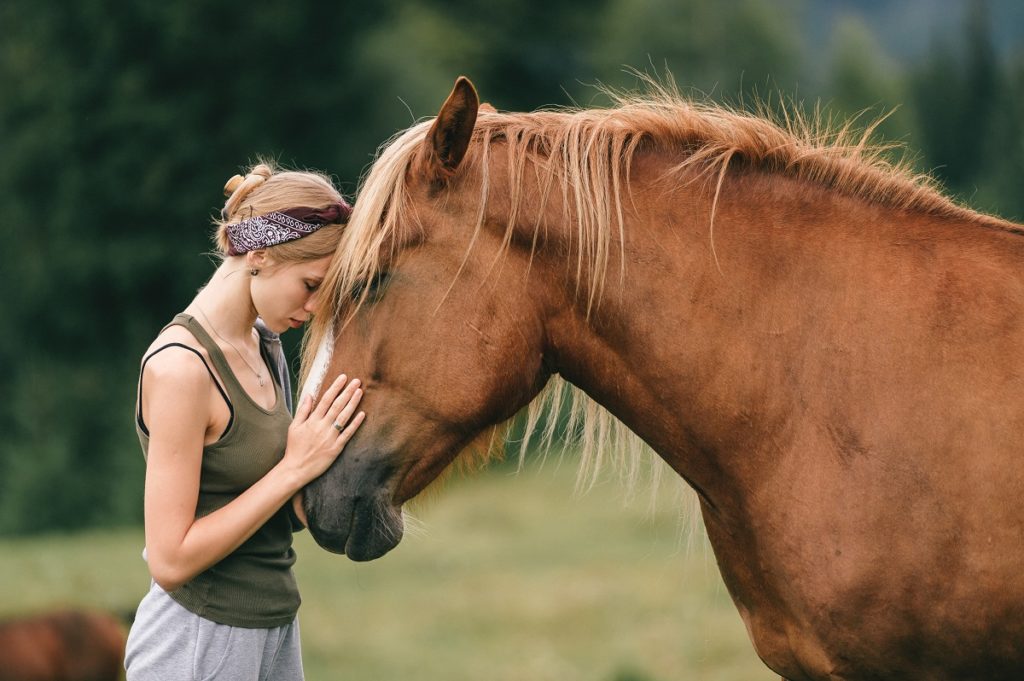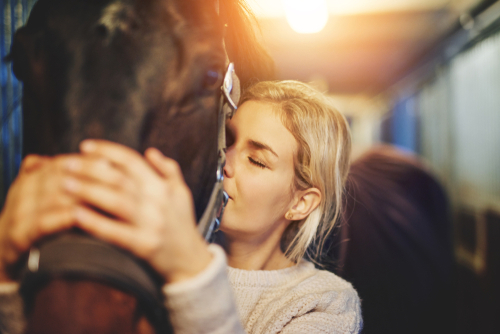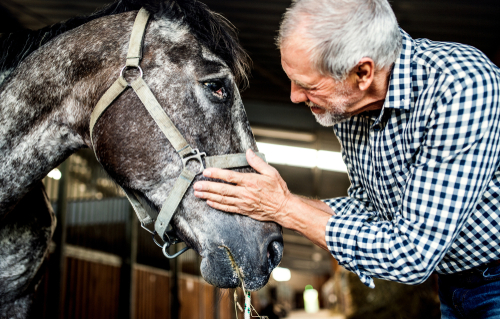If you ride or take care of horses, you’re probably all too familiar with anxiety in horses—whether it’s prompted by a backfiring truck up the road, a rustling plastic bag in the bushes, or a sprightly squirrel scuttling across the trail.
You’ll always want to take care of your pet, whether you want to bake cat birthday treats for your kitten’s special day, learn how to brush a dog, or in this case, help treat anxiety in horses. And although you might be helpless when it comes to treating an animal, there are a few things you can actually do to help with your horse’s anxiety for a smooth time together.
Treating anxiety in horses can sometimes feel like a wild goose chase, with any number of reasons leading to the nervousness of your four-legged friend, from external triggers to physical discomfort. Regardless of the cause of your horse’s nervousness, there are several strategies to help reduce their unease.
In this guide, you’ll learn how to observe nervousness in horses and find ways to reduce their jitters so that they can spend their days at pasture happy and healthy.
Common Signs of Nervousness in Horses
Wondering whether your riding companion is experiencing unease? It’s important to look out for the telltale signs. Horses are intelligent creatures, and their habits are often formed by a product of their schedules, environment, or handler.
If any of your horse’s behavior problems persist, talk to your veterinarian to make sure their apprehension isn’t a product of a more serious condition. To help determine whether your horse is experiencing any form of stress, keep an eye out for these signs:1
- Weaving or Stall Walking – According to the Merck Veterinary Manual, stall walking or weaving is a common horse behavior that’s compulsive and repetitive. Essentially, your horse will start to walk in circles or weave side to side for hours on end. 2These behaviors are often a sign of stress.
- Shaking or Trembling – If you are tending to your horse and notice any shaking or trembling, it could be a sign of nervousness. This is often seen as twitching skin that appears across their body.
- Rolled Eyes – Your horse isn’t giving you attitude (well, maybe it is). Rather, when you see the whites of your horse’s eyes it’s because the horse is scared. Look to see if they are exhibiting any additional trembling or rigid posture—your horse might be scared by something in its environment.
- Backing Away – Horses, like most animals, will look to get away from whatever is scaring them as quickly as possible. If your horse seems to be backing away and into a corner, it’s likely something has spooked it or they are remembering a time where something frightened them.
- Rearing – A horse that rears on its hind legs and prepares to strike may be experiencing extra stress. Oftentimes, aggression is a manifestation of apprehension, fear, or nervousness, typically due to environmental factors such as an unfavorable stranger or an intruding dog. Rearing is typically a horse’s attempt to escape a distressing situation.
- Bolting – When a horse is startled—like many prey herd animals—they instinctively attempt to run to get far away from the danger. Because bolting is driven by panic, it can result in injury if your horse is overwhelmed or unaware of its surroundings.
Causes of Horse Nervousness
The first step in helping your horse work through its panic is to identify the cause of its concern. This can sometimes be harder than you might expect—horses often can hold onto previous experiences and negative emotions, causing them to carry their uncertainty about a situation forward.
To determine how or why your horse might be getting nervous, consider the following seven factors that may be contributing to their distress:3
- Objects – Horses are naturally skittish when it comes to new objects or materials that they might not understand. Look out for any objects your horse might consider out of the ordinary like tractors, cars, garbage cans, bags, farm equipment, or even strange rocks.
- Places – Horses are herd animals, so they can often find boredom or fear in being alone and separated from other horses. If your horse struggles to listen to commands without another horse present (buddy-sour) or shows discomfort from leaving their stall or barn (barn-sour), your horse is probably nervous about being away from their home.
- Sounds – It’s always important to remember that horses are prey animals—they are constantly on alert. Skittish horses are likely to be afraid by surprising noises like a car-backfiring, loud banging, or even hissing sounds that might remind them of a snake.
- Clipping, Grooming, and Handling – Some horses get nervous or don’t like the various sensations needed for their upkeep. They might not like the way the clippers sound or feel. Some don’t like getting their shots, while others don’t like being shod. Make note of signs of nervousness when you’re primping your pony.
- Environmental Changes – Like any pet, moving location can be a cause of nervousness. During travel, a horse can be nervous about the new move, either from the trailer or to a new environment. Horses can also be affected by changes to or around their stall, like objects being moved, or new jumps or landscape being added to their corral.
- Work, Riding, and Training – If you’ve worked with horses long enough, you’re probably familiar with that one horse who always prefers a specific rider. Some horses may react negatively to strangers or riders they’re unfamiliar with. This can often lead to performance anxiety and confusion about certain commands, which can lead to more discomfort or panic.
- Animals – Horses are usually spooked by wildlife. Your horse may be afraid of cows, sheep, birds, squirrels, dogs, deer, or even other horses in the area.
- Physical Discomfort – When your horse is feeling physical discomfort, it can cause extra stress—both mental and physical. If you believe this is the case, contact your veterinarian immediately to find a solution and ease your horse’s aches.
Ways to Reduce Nervousness in Horses
Once you’ve determined the cause of your horse’s nervousness you might wonder what can be done now? Before you jump to the thought of sedatives or tranquilizers, consider that most horses are fairly receptive to diligent training or other methods. When you elect to use tranquilizers, it can often make the horse sluggish and prone to tripping and injury.
Instead, there are natural remedies that can often help your horse overcome nervousness just as well—if not better. Each horse has their own personality, so finding what works best can often depend on the horse. But with gentle, consistent care, your horse can begin to work back from its constant restlessness.
Here are some techniques and methods to help soothe your horse’s nervousness:4
1. Ground Manner Audit
The first and most important relationship between a horse and handler is the foundation of trust between humans and animals. Horses often look towards their handlers for direction in stressful situations—if you’re nervous, the horse is going to be nervous.
Through foundational training, make sure you’re employing these basic principles:5
- Repetition
- Leadership
- Consistency
- Trust
- Comfort
- Rest
If you think that poor ground manners might be the cause of unwanted stress, try reading up on training tutorials. Or, if you have a friend who is familiar with horses, let them sit in on your work with your horse to provide feedback and guidance. For a more professional approach, you can also seek the guidance of certified trainers who can help you form a behavioral routine.
2. Desensitization
With horses who are prone to stress from certain situations or objects, you can try to train them to be less reactive to the external stimulus. First, you introduce a scare-inducing stimulus slowly over time—like a spray bottle, clippers, a plastic bag, or even other farm animals. Eventually, your horse will learn that these stimuli aren’t a threat and will be less responsive.
To achieve this result, try using the advance-and-retreat method. When employing advance-and-retreat, you must have proper timing and reward the horse for calm behavior:6
- Step 1 – Slowly approach your horse while holding the scare-inducing object.
- Step 2 – When your horse starts to show signs of stress, stop approaching and hold your ground.
- Step 3 – Wait until your horse shows signs that they are relaxed, then turn around and hide the object with your back to the horse.
- Step 4 – Repeat this step several times, praising your horse after each calm reaction. Over time, you should be able to get closer and closer to your horse with the stimulus.
3. Sound Therapy
While your horse probably won’t appreciate you trying to soothe it with smooth jazz, sounds can be a great way to ease your horse’s discomfort. Depending on the horse, they might prefer different noises.
Sometimes, a horse might be nervous because you talk to them too much, causing confusion which then leads to stress. When working with your horse, try using a variety of sounds like humming, whispering, or even remaining quiet to see if you notice any reductions in their stress level.
4. Exercise
If boredom is likely the cause for your high-strung horse, then they most likely need an outlet for all that energy. Providing your horse with turnout—the ability to run free in a large spot of land—can be a great way to address all that pent-up energy.
If turnout is not an option, consider frequent exercise like riding or hand walking. Ensuring your horse has enough time to get out and stretch their legs can be a great way to reduce boredom—and by extension, their extra stress.
5. CBD
CBD can offer a way to soothe your horse’s nervousness and reduce its reaction to external triggers. Essentially, CBD works to promote mental and physical relaxation and ease by interacting with your horse’s endocannabinoid system, a full-body system that helps to regulate homeostasis.
CBD for horses often comes in the form of pellets. However, you can also add 15 drops of hemp oil under your horse’s tongue about three times a day, depending on the stressors of the environment and temper of your horse.
CBD for Soothing Stress in Horses
Nervousness in horses is never ideal. However, many external factors may trigger your sweet stallion’s fight or flight response. To that end, it’s essential to identify your horse’s triggers and responses and approach the situation accordingly.
If you’re looking to supplement your horse’s training and ease their nerves, consider Canna-Pet’s hemp CBD for horses.
Our CBD products are veterinarian recommended and made with organic and non-GMO hemp. Our high-concentration hemp oil is also the first and only whole plant extract for horses that’s been tested and approved by major institutions so you can ensure your horse is only getting the best.
Tame the jitters and ride easy with Canna-pet CBD.
Sources:
- Kauffman’s. How to Deal With Your Horse’s Anxiety. https://ka-hi.com/blog/equine/horse-anxiety/
- Merck Manual. Behavioral Problems of Horses. https://www.merckvetmanual.com/behavior/normal-social-behavior-and-behavioral-problems-of-domestic-animals/behavioral-problems-of-horses
- Equisearch. Ease Your Anxious Horse: Tips to Handle Horse Anxiety. https://www.equisearch.com/riding-and-training/managing-anxious-horse-29847
- Equus Magazine. Calming without Medication. https://equusmagazine.com/horse-world/calming-medication-53767
- Colorado Horse Council. Good Ground Manners. https://www.coloradohorsecouncil.com/good-ground-manners/
- Horse Illustrated. How to Desensitize Your Horse. https://www.horseillustrated.com/how-to-desensitize-your-horse






